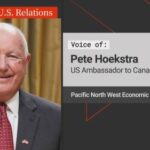In a move sending shockwaves through North American trade relations, former U.S. President Donald Trump announced plans to double tariffs on Canadian steel and aluminum imports should he reclaim the White House this November. The announcement, made during a campaign rally in Pittsburgh yesterday, has ignited fierce backlash from Canada’s metal manufacturing industry, with sector leaders warning of devastating economic consequences on both sides of the border.
“This represents nothing less than a direct attack on Canadian workers and the integrated supply chains that have benefited both American and Canadian industries for decades,” said Marion Stephens, CEO of the Canadian Steel Producers Association, in an emergency press briefing held in Ottawa this morning.
Trump’s proposed tariff increase would raise levies from the current 10% on aluminum and 25% on steel to a staggering 20% and 50% respectively. The former president justified the measure as necessary to “revitalize the American heartland” and protect U.S. manufacturing jobs, particularly in battleground states like Pennsylvania and Michigan.
Canadian Industry Minister François-Philippe Champagne immediately condemned the proposal, calling it “deeply misguided” and warning it would trigger retaliatory measures. “Our two nations’ steel and aluminum sectors are deeply integrated, with materials often crossing the border multiple times during production,” Champagne explained in a statement released through Canada News.
Economic analysts from the Royal Bank of Canada estimate the proposed tariffs could jeopardize approximately 85,000 Canadian jobs directly employed in the steel and aluminum sectors, with potential ripple effects threatening another 400,000 positions in related industries. The hardest-hit regions would likely include Hamilton, Ontario, and Saguenay, Quebec, where metal manufacturing remains a cornerstone of local economies.
“We’ve been down this road before in 2018, and it ended poorly for both countries,” noted Dr. Elaine Wong, trade economist at the University of Toronto. “The last time Trump imposed metal tariffs, studies showed they actually cost the U.S. economy about $900,000 per job saved in the steel sector, while raising costs for American manufacturers who use steel as inputs.”
The timing of Trump’s announcement coincides with ongoing negotiations between Washington and Ottawa regarding critical minerals and electric vehicle supply chains. Sources within CO24 Politics indicate Canadian diplomats view the tariff threat as potential leverage in these discussions, particularly regarding Canada’s role in supplying materials essential for America’s green energy transition.
Canadian steel and aluminum producers have invested heavily in carbon reduction technologies over the past decade, making them among the cleanest in the world. Industry representatives argue these environmental standards should be recognized in trade policies rather than penalized through blanket tariffs.
“American consumers will ultimately bear the cost of these tariffs through higher prices on everything from cars to canned goods,” warned Alex Martinson, director of the Aluminum Association of Canada. “This isn’t just bad policy for Canada—it’s bad for ordinary Americans too.”
The Canadian government has begun consulting with legal experts about potential challenges through the U.S.-Mexico-Canada Agreement (USMCA) dispute resolution mechanisms should the tariffs materialize. Previous steel tariffs under Trump’s first term were eventually removed after Canada imposed matching countermeasures on American goods.
Business leaders from both countries have formed an unusual alliance in opposition to the proposal. The U.S. Chamber of Commerce joined its Canadian counterpart in a rare joint statement condemning the tariff threat as “economically destructive” and urging cooler heads to prevail.
As markets react to this uncertainty, one question looms large over the integrated North American economy: will short-term political calculations once again override the decades of carefully cultivated economic partnership that has made both nations more prosperous?

























